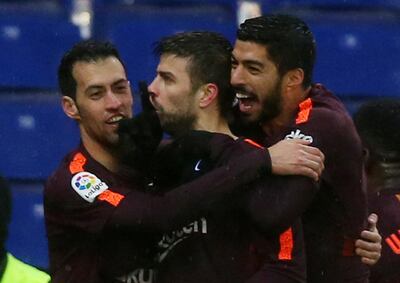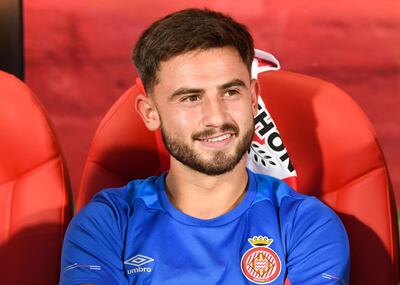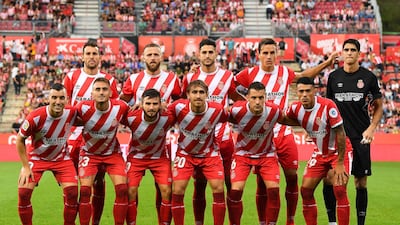Among the lush green mountains of northern Catalonia, a group of young football players dressed top to toe in blue gently jogs up and down a neatly cut sports field rented from a nearby golf club.
It is a region known more as a training ground for professional cyclists than would-be stars of the world’s biggest sport. But the athletes limbering up at Girona FC are part of a global business that has gained a foothold in Spain’s top league by investing in a club few football fans outside the country had heard of before last year.
Girona are partly owned by City Football Group, whose empire is financed by Abu Dhabi and China, and stretches from New York to Melbourne via its flagship club, Manchester City. The aim is to turn underdogs into developers of talent that can snatch players from under the nose of mighty Barcelona before dispatching them to the Premier League champions or selling them in the US$5 billion (Dh18.4bn) a year European transfer market.

“Maybe you don’t need to go to Barcelona anymore,” Ignacio Mas-Baga, the club’s chief executive, said at his office inside Girona’s recently expanded 14,500-capacity arena. “We’re trying to make local players bet on Girona because you can see a road ahead.”
On the field, the white-and-reds are in their second straight season in the Primera Liga after being promoted to the top league for the first time last year and finishing 10th. Along the way, they beat Real Madrid at the height of the political stand-off between Catalonia and the central government.
Girona will try to repeat the feat against the European champions this weekend after drawing their first game of the season last Friday.
Notching up success off the pitch may be trickier. Barcelona have a firmly established network of youth teams that fostered the careers of players including World Cup winners Sergio Busquets, Gerard Pique and Cesc Fabregas.
Girona’s unique selling proposition is to persuade young players to become part of a project.
The key is to snag defenders, midfielders and strikers who otherwise would not get a chance at Barcelona, said Rodrigo Fernandez Lovelle, a player agent whose clients have moved to and from clubs including Arsenal in England and Shakhtar Donetsk in Ukraine.

A club can only have a limited number of players for each position so there are always some available, he said. Then there should be the right environment to entice them.
“What you need in the end is good investments to have good fields, a good gym, good dressing rooms, a good academy, good residences, so that the kids can practice,” Lovelle said.
City Football Group owns New York City FC, clubs in Australia and Uruguay and a stake in one in Japan. The company and players’ agent Pere Guardiola, brother of Manchester City manager Pep Guardiola, each own 44.3 per cent of Girona. A group of small shareholders has the rest.
A look around Girona’s facilities shows that Manchester City’s owners have not transformed the Catalan club.
The stadium does not have enough parking spaces so the club commandeers one across the road on match days. The merchandise store outside of the arena barely fits a handful of people. Training facilities are still small and rented, although there are plans to build new ones.
The club's overall budget for this season will be about €52 million (Dh221m), including senior and youth teams and other expenses. While that is up from €8.5m in 2015/16, when the team won promotion and then gained broadcast revenue from playing in the Primera Liga, it is still less than Manchester City paid for one player in the summer, Riyad Mahrez from English rival Leicester City.
Mas-Baga said the club must stick within their own budget but benefits from belonging to the wider group when it comes to scouting players, marketing and sponsorship. Last season, five Manchester City players helped Girona stay in the top division of Spanish football.
The most recent signing is 21-year-old City-owned winger Patrick Roberts, who last week announced he was joining Girona on loan. Following his debut, he said “coming to Girona was the best decision I could make” for his career.
The club's Catalan identity still prevails. Outside the stadium are the flags of Girona the club, Girona the city and of Catalonia. Most signs and pamphlets are only written in Catalan. Carles Puigdemont, the former Catalan president who escaped as a fugitive to Belgium after declaring the region's independence last year, is from Girona and was a regular at games.

______________
Read more:
Steve Luckings: Khaldoon Al Mubarak on the progress of Melbourne City FC teams
WATCH: Khaldoon Al Mubarak on Pep, new players and retaining Premier League
______________
For the club’s managers, a core part of the marketing strategy is to maintain and increase local support while blooding players who may leave for the Premier League.
“A talented player can grow with Girona in the Spanish league, one of the best in the world,” said Delfi Geli, the club’s president and a former player. “If, for example, a player plays this year in Girona, next year he can play without any problem with the older brother.”
Still, 88-year-old Girona’s immediate goal is to consolidate itself as a regular Primera Liga team, according to Geli.
“First of all, we are a football club,” he said. “You need the ball to go in the net.”

